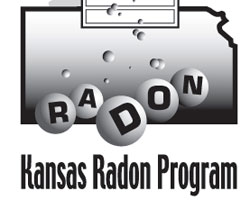Testing your home for radon
January 2016 is National Radon Action Month
 Graphic and caption available
Graphic and caption available
Released: Jan. 11, 2016
MANHATTAN, Kan. -- There's a saying: “What you don't know can't hurt you.”
Whether you agree or disagree, Bruce Snead, director of engineering extension at Kansas State University, is urging homeowners and other property owners to know the radon level in your home by testing for it.
Radon is an odorless, colorless and tasteless gas produced by the decay of natural radioactive materials found in the soil. It’s a naturally occurring environmental hazard that seeps into homes and other buildings through joints or cracks in the foundation and has been found above recommended levels in as many as one in four homes in Kansas, Snead said.
Radon is known to be the leading cause of lung cancer in non-smokers and the second leading cause of lung cancer in smokers, and testing is recommended, said Snead, who explained that testing need not be costly, or difficult.
“Many K-State Research and Extension offices offer low-cost test kits (between $5 and $10), and detectors also can be purchased at home, discount-department and hardware stores,” he said. Following the directions provided with the test kits and detectors is important, so the results will reveal the potential for elevated concentrations in the lowest lived-in level of the home.
If your results are low, consider repeating the test every two or three years or whenever there is a significant change in the home’s foundation, heating system or air tightness from weatherization efforts, Snead said.
If radon is present above the recommended ceiling (4.0 pCiL/Pico Curies per liter), a confirmatory test should be conducted. If you want to know the radon concentration in other areas of your home, conduct the desired number of tests at the same time. When high results are confirmed, Snead recommends consulting a radon professional for mitigation system installation.
In Kansas, beginning July 1, 2009, all residential real estate sales contracts have a recommendation for radon testing and disclosure of results. Mitigation is not, however, required at this time, Snead said.
More information about radon, including testing and mitigation, is available at most K-State Research and Extension offices, via the Kansas Radon Program at Kansas Radon Program and by phone, toll-free: 1-800-693-5343. The Environmental Protection Agency's National Radon Program Services is housed in the Engineering Extension Department at K-State.
-30-
K-State Research and Extension is a short name for the Kansas State University Agricultural Experiment Station and Cooperative Extension Service, a program designed to generate and distribute useful knowledge for the well-being of Kansans. Supported by county, state, federal and private funds, the program has county Extension offices, experiment fields, area Extension offices and regional research centers statewide. Its headquarters is on the K-State campus in Manhattan.
For more information, contact:
Bruce Snead is at 785-532-6026 or bsnead@ksu.edu
